 Operation and Maintenance
Operation and Maintenance
 Nginx
Nginx
 Sony confirms the possibility of using special GPUs on PS5 Pro to develop AI with AMD
Sony confirms the possibility of using special GPUs on PS5 Pro to develop AI with AMD
Sony confirms the possibility of using special GPUs on PS5 Pro to develop AI with AMD
Mark Cerny, chief architect of Sony Interactive Entertainment (SIE, Sony Interactive Entertainment), has revealed more hardware details for next-generation host PlayStation 5 Pro (PS5 Pro), including a performance upgraded AMD RDNA 2.x architecture GPU, and a machine learning/artificial intelligence program code-named "Amethylst" with AMD.

The focus of PS5 Pro performance improvement is still on three pillars, including a more powerful GPU, advanced ray tracing and AI-powered PSSR super-resolution capabilities.
The GPU adopts a customized AMD RDNA 2 architecture, which Sony named RDNA 2.x. It has advanced features that only imported by some RDNA 3 architectures, and has increased by 67% from 18 sets of WGPs (36 sets of CUs) with built-in GPUs on the original PS5 to 30 sets of WGPs (60 sets of CUs).
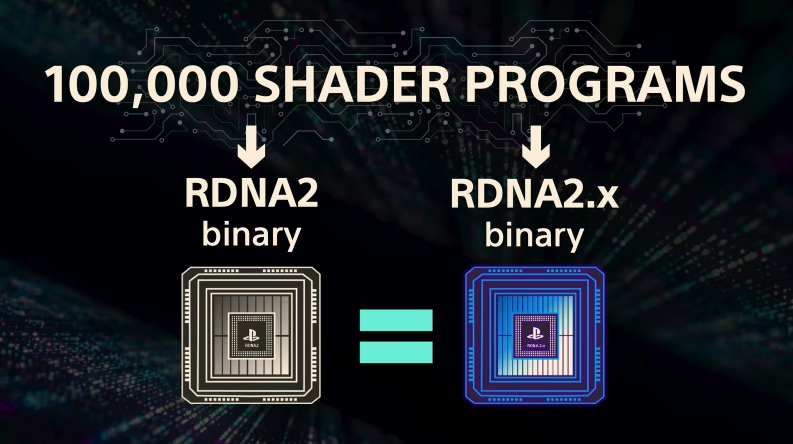
Sony stressed that the reason they don’t want to upgrade their architecture to RDNA 3 is because they think that PS5 and PS5 Pro are the same generation of products and do not want the game to launch different versions to match the two models. Existing games do not need to specifically adjust the rendering and shading methods, and can use GPU resources smoothly.
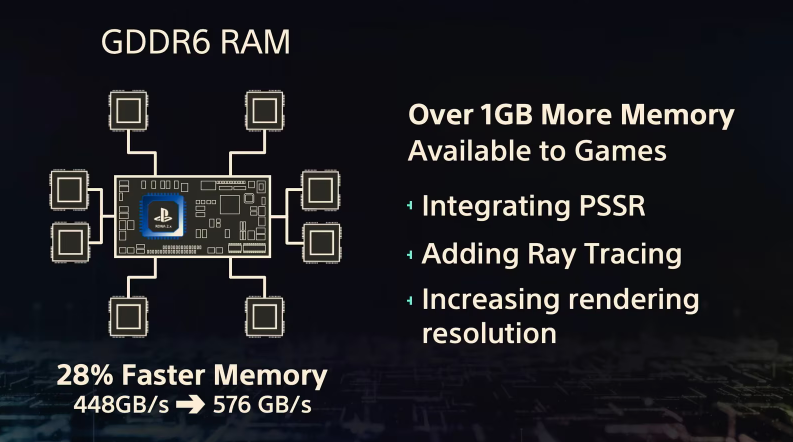
The memory is not listed in the exact specifications and configurations. It is only mentioned that the PS5 Pro still uses GDDR6, but the bandwidth has increased by 28% from 448 GB/s of the PS5 to 576 GB/s, and the memory capacity allocated to the game has increased by more than 1GB.
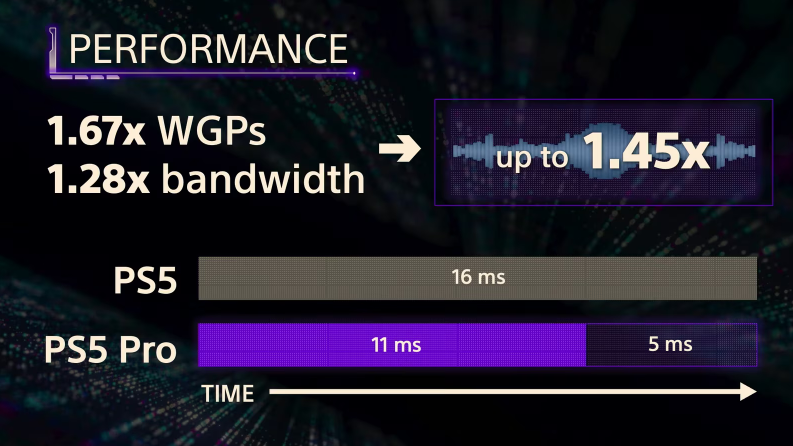
With the dual improvement of GPU size 67% and memory bandwidth 28% increase, the overall gaming performance of the PS5 Pro can be improved by about 45% compared to the PS5. Here, for example, the original time required for PS5 to render 1 frame was about 16 ms, and the PS5 Pro can only be completed in 11 ms.
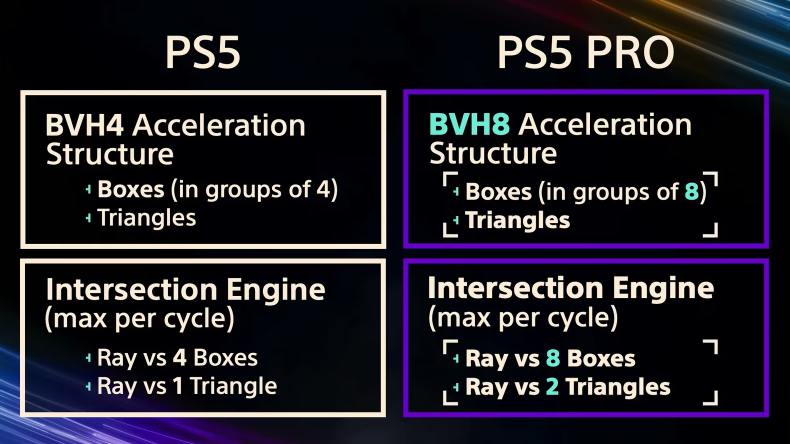
In terms of ray tracing, the RDNA 2.x GPU specially made for PS5 Pro can support BVH8 acceleration structure, and the number of intersections between each cycle multilateral type and the ray border is increased from 1 to 2.
Sony also divided the original PS5 coloring code into two stacks and added and removed them to the PS5 Pro to integrate them, effectively simplifying the coloring stroke to improve performance.
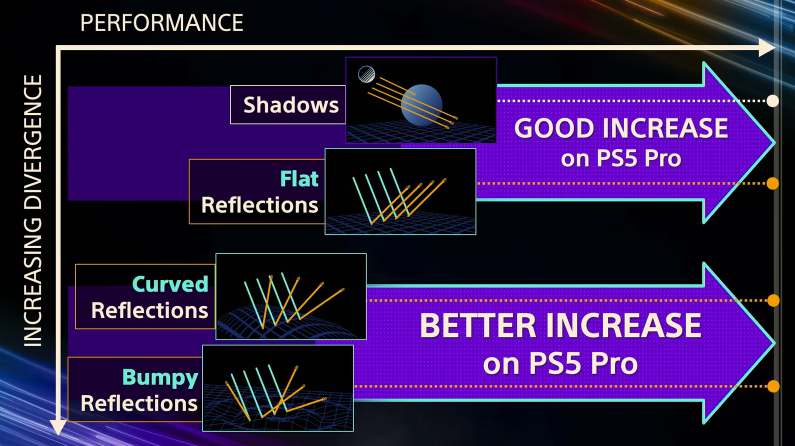
Therefore, compared with PS5, the PS5 Pro has slightly improved its shadow and plane reflection performance, while the surface reflection and diffuse performance has significantly improved its surface reflection and diffuse performance.
PSSR is the abbreviation of PlayStation Spectral Super Resolution. It uses a convolutional neural network to expand the selected and dyed pictures with lower resolution into high resolution, or generate picture grids (complement frames) to improve picture fluency.
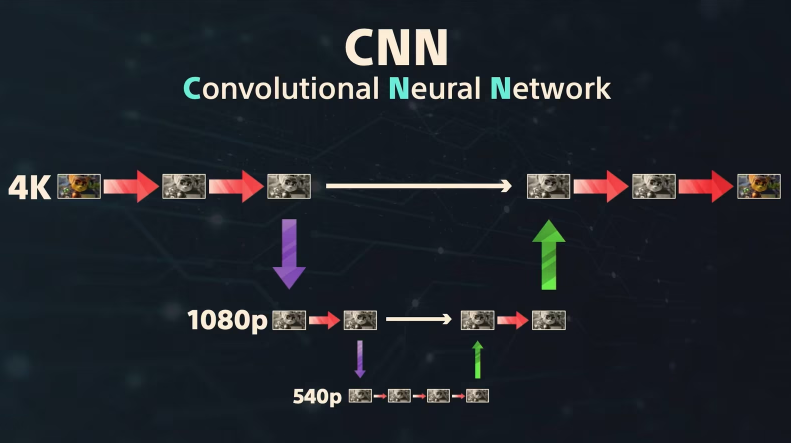
Compared with PCs, it mostly uses fixed rendering low resolution and fixed Upscaling magnification, PS5 Pro adopts a combination mode of dynamic modulation and magnification to provide a fixed and smooth game screen.
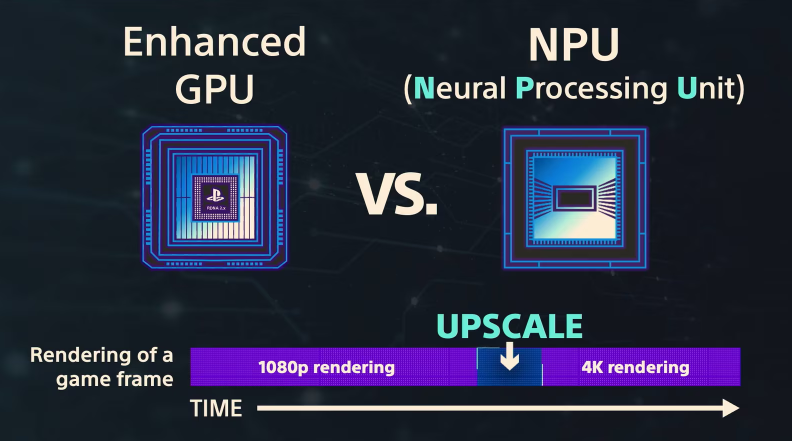
Finally, Mark Cerny pointed out that Sony will work closely with AMD to develop hardware architectures that are more suitable for machine learning and artificial intelligence, as well as more convolutional neural networks for gaming. This plan is not exclusive to Sony, but allows more developers to obtain resources from it.
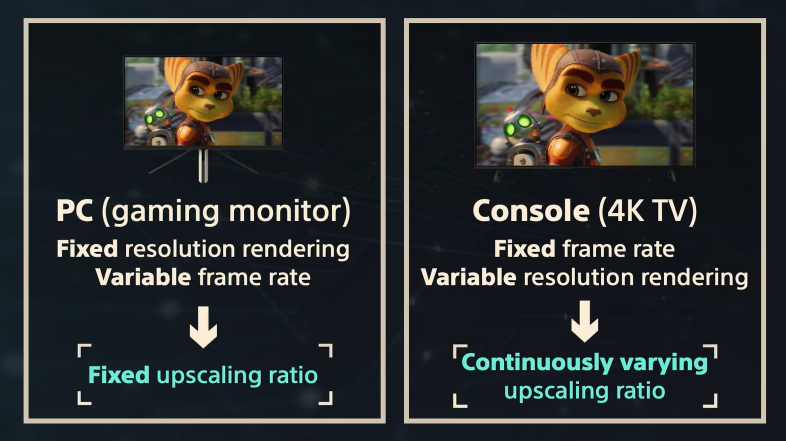
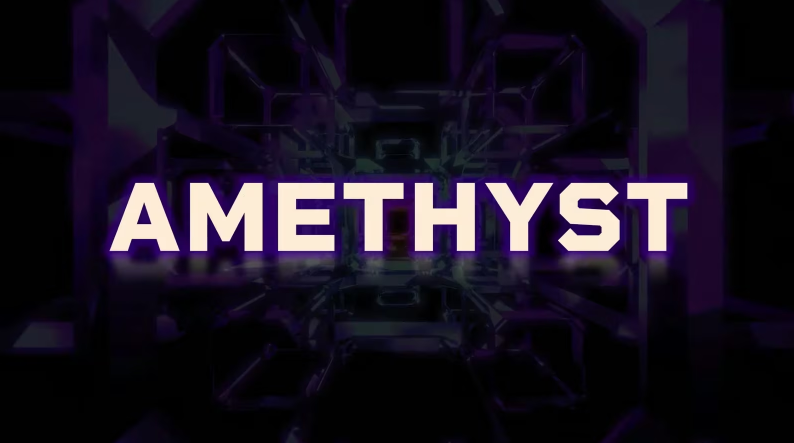
The above is the detailed content of Sony confirms the possibility of using special GPUs on PS5 Pro to develop AI with AMD. For more information, please follow other related articles on the PHP Chinese website!

Hot AI Tools

Undresser.AI Undress
AI-powered app for creating realistic nude photos

AI Clothes Remover
Online AI tool for removing clothes from photos.

Undress AI Tool
Undress images for free

Clothoff.io
AI clothes remover

Video Face Swap
Swap faces in any video effortlessly with our completely free AI face swap tool!

Hot Article

Hot Tools

Notepad++7.3.1
Easy-to-use and free code editor

SublimeText3 Chinese version
Chinese version, very easy to use

Zend Studio 13.0.1
Powerful PHP integrated development environment

Dreamweaver CS6
Visual web development tools

SublimeText3 Mac version
God-level code editing software (SublimeText3)

Hot Topics
 Decryption Gate.io Strategy Upgrade: How to Redefine Crypto Asset Management in MeMebox 2.0?
Apr 28, 2025 pm 03:33 PM
Decryption Gate.io Strategy Upgrade: How to Redefine Crypto Asset Management in MeMebox 2.0?
Apr 28, 2025 pm 03:33 PM
MeMebox 2.0 redefines crypto asset management through innovative architecture and performance breakthroughs. 1) It solves three major pain points: asset silos, income decay and paradox of security and convenience. 2) Through intelligent asset hubs, dynamic risk management and return enhancement engines, cross-chain transfer speed, average yield rate and security incident response speed are improved. 3) Provide users with asset visualization, policy automation and governance integration, realizing user value reconstruction. 4) Through ecological collaboration and compliance innovation, the overall effectiveness of the platform has been enhanced. 5) In the future, smart contract insurance pools, forecast market integration and AI-driven asset allocation will be launched to continue to lead the development of the industry.
 What are the top currency trading platforms? The top 10 latest virtual currency exchanges
Apr 28, 2025 pm 08:06 PM
What are the top currency trading platforms? The top 10 latest virtual currency exchanges
Apr 28, 2025 pm 08:06 PM
Currently ranked among the top ten virtual currency exchanges: 1. Binance, 2. OKX, 3. Gate.io, 4. Coin library, 5. Siren, 6. Huobi Global Station, 7. Bybit, 8. Kucoin, 9. Bitcoin, 10. bit stamp.
 Which of the top ten currency trading platforms in the world are the latest version of the top ten currency trading platforms
Apr 28, 2025 pm 08:09 PM
Which of the top ten currency trading platforms in the world are the latest version of the top ten currency trading platforms
Apr 28, 2025 pm 08:09 PM
The top ten cryptocurrency trading platforms in the world include Binance, OKX, Gate.io, Coinbase, Kraken, Huobi Global, Bitfinex, Bittrex, KuCoin and Poloniex, all of which provide a variety of trading methods and powerful security measures.
 Recommended reliable digital currency trading platforms. Top 10 digital currency exchanges in the world. 2025
Apr 28, 2025 pm 04:30 PM
Recommended reliable digital currency trading platforms. Top 10 digital currency exchanges in the world. 2025
Apr 28, 2025 pm 04:30 PM
Recommended reliable digital currency trading platforms: 1. OKX, 2. Binance, 3. Coinbase, 4. Kraken, 5. Huobi, 6. KuCoin, 7. Bitfinex, 8. Gemini, 9. Bitstamp, 10. Poloniex, these platforms are known for their security, user experience and diverse functions, suitable for users at different levels of digital currency transactions
 How to use the chrono library in C?
Apr 28, 2025 pm 10:18 PM
How to use the chrono library in C?
Apr 28, 2025 pm 10:18 PM
Using the chrono library in C can allow you to control time and time intervals more accurately. Let's explore the charm of this library. C's chrono library is part of the standard library, which provides a modern way to deal with time and time intervals. For programmers who have suffered from time.h and ctime, chrono is undoubtedly a boon. It not only improves the readability and maintainability of the code, but also provides higher accuracy and flexibility. Let's start with the basics. The chrono library mainly includes the following key components: std::chrono::system_clock: represents the system clock, used to obtain the current time. std::chron
 How much is Bitcoin worth
Apr 28, 2025 pm 07:42 PM
How much is Bitcoin worth
Apr 28, 2025 pm 07:42 PM
Bitcoin’s price ranges from $20,000 to $30,000. 1. Bitcoin’s price has fluctuated dramatically since 2009, reaching nearly $20,000 in 2017 and nearly $60,000 in 2021. 2. Prices are affected by factors such as market demand, supply, and macroeconomic environment. 3. Get real-time prices through exchanges, mobile apps and websites. 4. Bitcoin price is highly volatile, driven by market sentiment and external factors. 5. It has a certain relationship with traditional financial markets and is affected by global stock markets, the strength of the US dollar, etc. 6. The long-term trend is bullish, but risks need to be assessed with caution.
 How to measure thread performance in C?
Apr 28, 2025 pm 10:21 PM
How to measure thread performance in C?
Apr 28, 2025 pm 10:21 PM
Measuring thread performance in C can use the timing tools, performance analysis tools, and custom timers in the standard library. 1. Use the library to measure execution time. 2. Use gprof for performance analysis. The steps include adding the -pg option during compilation, running the program to generate a gmon.out file, and generating a performance report. 3. Use Valgrind's Callgrind module to perform more detailed analysis. The steps include running the program to generate the callgrind.out file and viewing the results using kcachegrind. 4. Custom timers can flexibly measure the execution time of a specific code segment. These methods help to fully understand thread performance and optimize code.
 What are the top ten virtual currency trading apps? The latest digital currency exchange rankings
Apr 28, 2025 pm 08:03 PM
What are the top ten virtual currency trading apps? The latest digital currency exchange rankings
Apr 28, 2025 pm 08:03 PM
The top ten digital currency exchanges such as Binance, OKX, gate.io have improved their systems, efficient diversified transactions and strict security measures.





